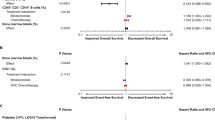Abstract
Blinatumomab is an immunotherapy drug approved for the treatment of acute lymphoblastic leukemia. Since not all patients respond to blinatumomab, markers are needed to predict the efficacy of blinatumomab in individual patients. We hypothesized that the pre-treatment blast-to-lymphocyte ratio would predict blinatumomab efficacy. To examine this possibility, we conducted a post hoc analysis using data from the TOWER Clinical Trials (NCT02013167). Multivariate analysis showed that, along with the treatment groups, each of the following was independently correlated with superior progression-free survival: salvage-treatment phase, allogeneic stem cell transplantation, and pre-treatment ratio of bone marrow blasts-to-peripheral blood lymphocytes < 25.

Similar content being viewed by others
Data availability
The data belongs to AMGEN and provided though Clinical Trail Data and Document Sharing Request.
References
Löffler A, Gruen M, Wuchter C et al (2003) Efficient elimination of chronic lymphocytic leukaemia B cells by autologous T cells with a bispecific anti-CD19/anti-CD3 single-chain antibody construct. Leukemia 17:900–909. https://doi.org/10.1038/sj.leu.2402890
Dreier T, Lorenczewski G, Brandl C et al (2002) Extremely potent, rapid and costimulation-independent cytotoxic T-cell response against lymphoma cells catalyzed by a single-chain bispecific antibody. Int J Cancer 100:690–697. https://doi.org/10.1002/ijc.10557
Hoffmann P, Hofmeister R, Brischwein K et al (2005) Serial killing of tumor cells by cytotoxic T cells redirected with a CD19-/CD3-bispecific single-chain antibody construct. Int J Cancer 115:98–104. https://doi.org/10.1002/ijc.20908
Brandl C, Haas C, D’Argouges S et al (2007) The effect of dexamethasone on polyclonal T cell activation and redirected target cell lysis as induced by a CD19/CD3-bispecific single-chain antibody construct. Cancer Immunol Immunother 56:1551–1563. https://doi.org/10.1007/s00262-007-0298-z
Huo Y, Sheng Z, Lu DR et al (2021) Blinatumomab-induced T cell activation at single cell transcriptome resolution. BMC Genomics 22:1–16. https://doi.org/10.1186/s12864-021-07435-2
Löffler A, Kufer P, Lutterbüse R et al (2000) A recombinant bispecific single-chain antibody, CD19 x CD3, induces rapid and high lymphoma-directed cytotoxicity by unstimulated T lymphocytes. Blood 95:2098–2103. https://doi.org/10.1182/blood.v95.6.2098
Topp MS, Gökbuget N, Zugmaier G et al (2014) Phase II trial of the anti-CD19 bispecific T cell-engager blinatumomab shows hematologic and molecular remissions in patients with relapsed or refractory B-precursor acute lymphoblastic leukemia. J Clin Oncol 32:4134–4140. https://doi.org/10.1200/JCO.2014.56.3247
Topp MS, Gökbuget N, Stein AS et al (2015) Safety and activity of blinatumomab for adult patients with relapsed or refractory B-precursor acute lymphoblastic leukaemia: a multicentre, single-arm, phase 2 study. Lancet Oncol 16:57–66. https://doi.org/10.1016/S1470-2045(14)71170-2
Kantarjian H, Stein A, Gökbuget N et al (2017) Blinatumomab versus chemotherapy for advanced acute lymphoblastic leukemia. N Engl J Med 376:836–847. https://doi.org/10.1056/nejmoa1609783
Rogala B, Freyer CW, Ontiveros EP et al (2015) Blinatumomab: enlisting serial killer T-cells in the war against hematologic malignancies. Expert Opin Biol Ther 15:895–908. https://doi.org/10.1517/14712598.2015.1041912
Wei AH, Ribera JM, Larson RA et al (2021) Biomarkers associated with blinatumomab outcomes in acute lymphoblastic leukemia. Leukemia 35:2220–2231. https://doi.org/10.1038/s41375-020-01089-x
Shimazu Y, Kanda J, Kaneko H et al (2022) Monocyte or white blood cell counts and β2 microglobulin predict the durable efficacy of daratumumab with lenalidomide. Ther Adv Hematol. https://doi.org/10.1177/20406207221142487
Shimazu Y, Kanda J, Kosugi S et al (2023) Efficacy of elotuzumab for multiple myeloma in reference to lymphocyte counts and kappa/lambda ratio or B2 microglobulin. Sci Rep 13:5159. https://doi.org/10.1038/S41598-023-32426-6
Kanda Y (2013) Investigation of the freely available easy-to-use software “EZR” for medical statistics. Bone Marrow Transpl 48:452–458. https://doi.org/10.1038/bmt.2012.244
Funding
The authors received no financial support for the research, authorship, and/or publication of this article.
Author information
Authors and Affiliations
Contributions
YS and TK performed the research, analyzed data and wrote the paper; TK and supervised the study and performed writing reviewing.
Corresponding author
Ethics declarations
Conflict of interest
All the other authors have no conflict of interest regarding to this study.
Ethical approval
All procedures performed in this study involving the patient were in accordance with the 1964 Helsinki declaration and its later amendments or comparable ethical standards. The ethical approval was waived by Kyoto University Graduate School and Faculty of Medicine, Ethics Committee institutional because the data was provided as anonymized data and the ad-hoc nature of this study.
Additional information
Publisher's Note
Springer Nature remains neutral with regard to jurisdictional claims in published maps and institutional affiliations.
Supplementary Information
Below is the link to the electronic supplementary material.
Rights and permissions
Springer Nature or its licensor (e.g. a society or other partner) holds exclusive rights to this article under a publishing agreement with the author(s) or other rightsholder(s); author self-archiving of the accepted manuscript version of this article is solely governed by the terms of such publishing agreement and applicable law.
About this article
Cite this article
Shimazu, Y., Kitawaki, T., Kondo, T. et al. Pretreatment blast-to-lymphocyte ratio as a prognostic marker for CD19/CD3-bispecific T cell-engaging antibodies (blinatumomab) treatment against relapsed or refractory B-precursor acute lymphoblastic leukemia. Cancer Immunol Immunother 72, 3861–3865 (2023). https://doi.org/10.1007/s00262-023-03514-3
Received:
Accepted:
Published:
Issue Date:
DOI: https://doi.org/10.1007/s00262-023-03514-3




